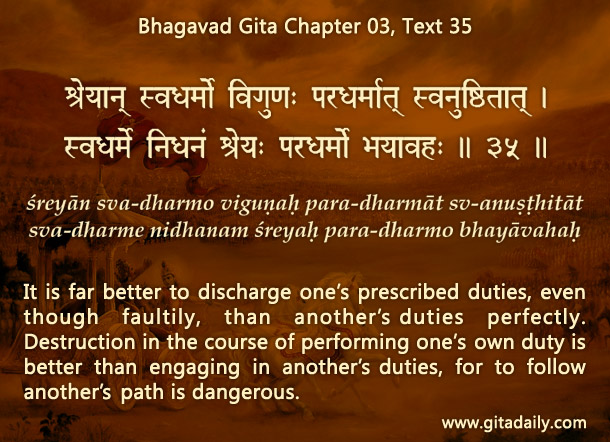We are all distinct individuals. Given our differences, no material formula can work uniformly for everyone, just as one shoe can’t fit all people.
Acknowledging such individual distinctiveness, Gita wisdom endorses varnashrama, a social system that offers people vocations according to their inclinations. Each vocation has its rewards and challenges. For those inclined to a particular vocation, its rewards outweigh its challenges. Thus for a person with kshatriya inclination, the fulfillment in using one’s talents to head a state competently is greater than the anxiety coming from such a demanding political position. A brahmana, on the other hand, would find that anxiety a burdensome distraction from the brahminical inclination to study. And conversely, a kshatriya would find a brahmana’s life too simple to be palatable.
Yet during phases of acute trouble in one’s vocation, one may find another’s vocation alluring; the grass on the other side might seem greener. That’s what happened to Arjuna on the Kurukshetra battlefield when he had to fight against his loved ones – he felt tempted to adopt the nonviolent brahminical vocation.
The Bhagavad-gita (03.35) firmly disapproves such whimsical changing of vocations because it would require repressing one’s nature (03.33) – something that is unsustainable and undesirable.
If Arjuna adopted a brahmana’s vocation, then in the course of life when he would be disrespected, his kshatriya nature would spring up and he would raise weapons to retaliate against the offender. His engaging in such violence while professing to be a brahmana would make him karmically culpable because brahmanas are dharmically enjoined to nonviolence (18.42). Instead of courting adharma thus, if he gallantly stuck to his natural vocation even amidst duress, he would gain dharmic credits for his long-term benefit.
Apart from this verse’s varnashrama-specific application, its import speaks to us today: don’t imitate others, be true to yourself.

Explanation of article:
Podcast:


Thank you for your daily commentaries. They are very thought provoking and most appreciated.
Just a query about varnashrama. Doesn’t varna mean colour and does this mean varnashrama describes classification of human society based on the colour of their skin or how fair they are?
Hare Krishna
Answered here:
http://www.thespiritualscientist.com/2015/01/as-varna-means-color-is-varnashrama-based-on-bodily-color/
ys
ccdas